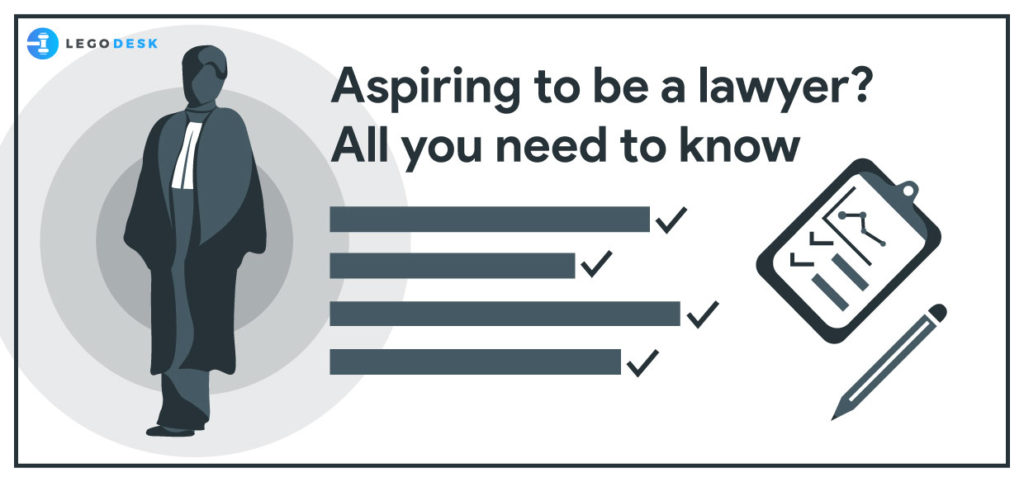Aspiring to be a lawyer? All you need to know

Lawyers are entitled to but not limited to, providing legal services to the public at large, which includes advising, representing clients, negotiating, arbitrating, etc. Becoming a successful lawyer requires skills and knowledge at its best. The requirement of each country may vary some experience that is required to be possessed by every lawyer is extensive training in legal procedure, drafting, research, etc.
Read Also – How to Become a Lawyer Without Law School
Admission test:
The admission test/Entrance Examination is the stepping stone to get into any Law School. The entrance exam is an objective paper that takes an understanding of the student on various subjects like Reasoning, General Awareness, English, Legal Aptitude, Elementary mathematics, etc. Most of the universities conduct their own entrance test to take admission. The most common exam is CLAT (Common Law Admission Test) on clearing which admission can be taken in 14 National Law Universities on the basis of the rank secured. Other exams like SET, AILET, LSAT are for admission into specific universities.
Read Also – Law as a career in 2020
The two-fold condition to be eligible for the admission test is:
- The candidate should be below the age of 20 years (22 years for SC/ST category) can apply;
- The candidate should have scored a minimum of 45% in aggregate in the Senior Secondary Examination (42% for OBC and 40% for SC/ST).[1]
Course to become a lawyer
In India, to become a lawyer, a person has to undertake the course of LL. B (Legum Baccarlaureus), i.e., Bachelor of Law. LL. B is a three-year graduate program (traditional course) that is designed for the students who wish to pursue the legal profession. A student pursues LL. B after successful completion of an undergraduate course. The course can be of any discipline to be eligible for the law. The process of completing education in the legal sector usually takes a minimum of 5 years and a maximum of 7 years to complete.
Certain universities have offered the facility to students to choose law as an undergraduate course for a duration of five years (integrated course). This can be pursued by a student after completing the 12th Class. This is considered to be a dual degree or double graduation course. There are options available to a student to choose from like B.A. LL. B or B.B.A.LL. B.
Read Also – What does a lawyer do?
The curriculum designed is not fixed or not central; however, most courses provide a wide-ranging view of all the fields of law which will help the student build insight into his future prospects.
Various universities offer diploma courses (online and offline) in various fields of law like corporate laws, tax laws, etc. which may be pursued to have specific knowledge about the field of law a student is interested in.
Like all other courses, Master of Law (LL. M) can also be pursued by the students who are a 2-year course. Every student who is a LL. B can apply and pursue masters. This is a course pursued to have in-depth knowledge about the discipline. Getting a doctorate degree is also opted by many students who expertise in a particular discipline of law.
Practical training is the most important aspect of every school and a part of the curriculum. Internship plays a crucial role in building the blocks of the law career. Though this is not a mandatory requirement in many institutes, it is recommended to grasp a command over the area of law.
Read Also: Living life as a lawyer
Qualifying the Bar Exam:
The bar exam is a final block that needs to be cleared in order to be eligible to provide legal assistance to people. Clearing the Bar exam helps a person gets a license to practice. This is what makes a lawyer an advocate (Yes, there is a difference) who is then governed by the Advocates Act, 1961. The bar exam also called as All India Bar Examination
Please note, a person enrolls himself in the state bar council, i.e., state-based enrolment. However, a person can get his name transferred from one state to another but can have enrolment in two states.
Read Also – Top Eight law colleges in India
Having personal attributes and required skills can help attain huge success. For becoming a successful lawyer, the marks obtained contributes in a very negligible way. It is important to choose your area of interest in law to proceed. Skills like reasoning, general awareness, ability to tackle types of cases, being a good orator, self-confidence gives a boost and added bonus over the others. On the education side, having an LL.B degree is the minimum qualification a person needs to attain to become a lawyer.
[1] http://www.barcouncilofindia.org/educational-criteria-educational-qualification-required-for-admission-into-3-year-and-5-year-law-courses-in-india/
Try our Debt Resolution solutions today Request a Demo